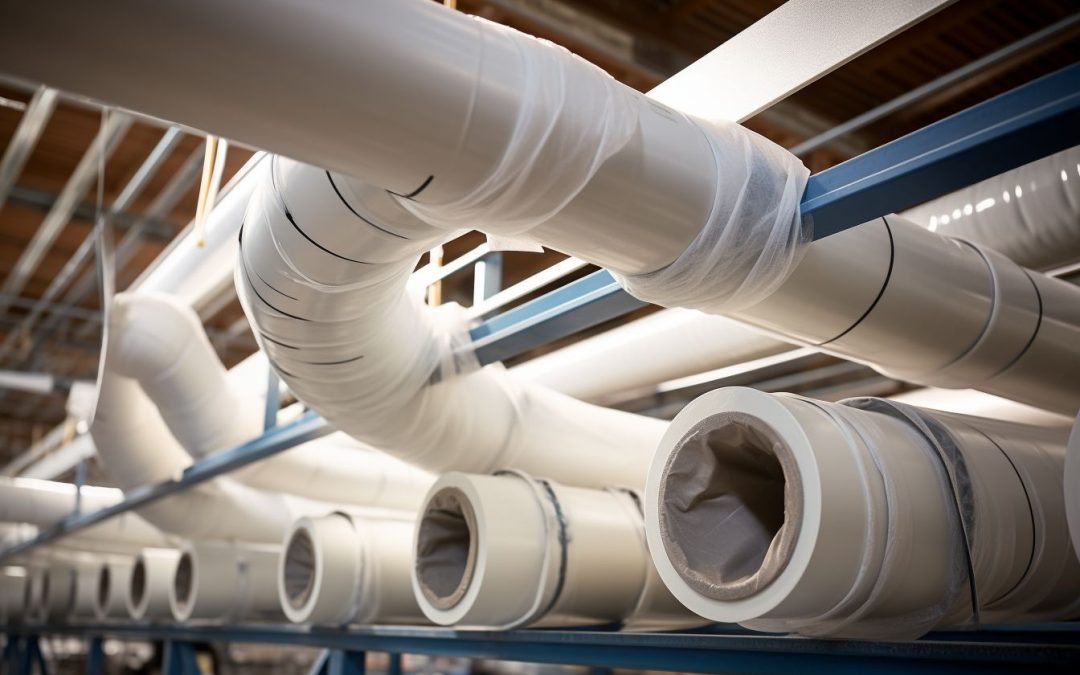Thermal Conductivity:
The ability of the insulation material to withstand heat transmission is determined by its thermal conductivity or k-value. Better insulation performance is indicated by a lower k-value. Select materials with low thermal conductivity to reduce heat gain or loss and guarantee the AC system runs effectively.
Resistance to Moisture:
The temperatures at which pipes frequently function can result in condensation. To avoid water absorption, which can result in decreased insulation performance, pipe corrosion, and the formation of mould, insulation should have a high level of moisture resistance. For reducing moisture intrusion, closed-cell insulation—like foam rubber or polyethene—is the best option.
Longevity and Durability:
Environmental stresses such as temperature changes, UV rays, and physical wear should not injure AC pipe insulation. Long-term cost savings are achieved by using durable materials since they require less frequent replacement.
Fire Resistance:
Safety is crucial, especially in buildings used for residential and commercial purposes. Insulation materials should have a high fire resistance rating and adhere to local fire safety regulations. Seek out materials with flame-retardant additives or that are non-flammable.
Range of Temperatures:
Think about the range of temperatures that the insulation material can withstand. Since refrigerants are frequently carried by AC pipes at extremely low temperatures, the insulation must continue to function properly in harsh environments without breaking or deteriorating.
The Insulation Thickness:
The insulation’s capacity to stop moisture and heat transfer is influenced by its thickness. The pipe diameter, operating temperature, and environmental conditions are some of the variables that affect the necessary thickness. To find the right thickness, it can be helpful to consult pertinent standards, such as ASHRAE recommendations.
Simplicity of Installation:
Installing the insulation material should be simple, particularly in confined areas or with intricate pipe configurations. For faster and more economical installations, flexible materials that can be cut and sculpted without the need for specialized tools are favoured.
Compatibility with Refrigerants:
The insulation material ought to be compatible with the AC system’s refrigerant. The effectiveness and safety of the system may be jeopardized by incompatible materials that deteriorate or react chemically.
Resistance to UV:
UV-resistant insulation is essential for outdoor air conditioning pipes that are exposed to sunlight. Long-term exposure to UV light can deteriorate non-UV-resistant materials, shortening their lifespan and insulating qualities.
The Ability To Withstand Mechanical Damage:
Pest activity or unintentional hits could cause mechanical damage to the insulation on exposed AC pipes. Such damage can be avoided by choosing materials with durable exterior coatings or covers.
Cost-Effectiveness:
Cost and performance must be balanced. Although premium materials may cost more upfront, their longevity and effectiveness can save money over time by lowering maintenance costs and energy losses.
Effects on the Environment:
Examine the insulation material’s effects on the environment, taking into account its manufacturing method and recyclable nature. Eco-friendly choices, such as those composed of recycled materials or materials with minimal volatile organic compounds (VOCs), are becoming more and more well-liked.
Adherence to the Rules:
Verify that the insulation material selection conforms with regional and global standards, such as ASHRAE, ASTM, or ISO requirements. This ensures that the material satisfies environmental, performance, and safety standards.
Adaptability and Flexibility:
Because pipes frequently include couplings, bends, and different diameters, insulation materials must be flexible and adaptable. Pre-formed pipe sections or flexible foam insulation might make installation easier on uneven pipe layouts.
Chemical Resistance:
Cleaning supplies, oils, and other chemicals could come into contact with air conditioning systems. When exposed to such contaminants, the insulation material should not deteriorate or swell.
Acoustic Performance:
Noise reduction is a top concern in some environments, such as houses or workplaces. Noise from refrigerant flow or pipe vibrations can be reduced with the use of insulation materials that have sound-dampening qualities.
Aesthetic and Appearance Factors:
In installations that are exposed, the insulation’s appearance could have a role. You can choose materials with smooth surfaces or colours that you can customize to match the surroundings around you.
Other Things to Consider:
- Needs for Maintenance: Select insulating materials that need less upkeep. Regular inspections and repairs are less necessary with alternatives that are long-lasting and resistant to dampness.
- Changes in Temperature: The insulation material should hold up over time without breaking or losing its flexibility if the AC pipes are situated in an area that experiences regular temperature changes.
- Warranty and Brand Reputation: Lastly, get insulation from a reliable company that has a solid guarantee and good reviews. This guarantees quality and offers assistance in the event of flaws or problems.
Final Thoughts:
A number of considerations must be made when choosing the best insulation for AC pipes, including safety, durability, and thermal performance. By taking these factors into account, you can make sure the insulation not only increases the AC system’s efficiency but also increases its lifespan and lowers maintenance expenses.
Frequently Asked Questions:
1. What Is The Ideal Insulation Thickness For Air Conditioning Pipes?
A number of variables, including pipe diameter, operating temperatures, and environmental conditions, affect the necessary thickness. Though ASHRAE or local standards ensure proper selection, thicker insulation is generally better for minimising heat loss and reducing condensation.
2. Can The Operation Of An Air Conditioner Be Impacted By Damaged Pipe Insulation?
Indeed, poor insulation can result in higher condensation, decreased cooling effectiveness, and energy loss, which may lead to pipe corrosion and water damage. It is imperative to conduct routine inspections and promptly replace any damaged insulation.
3. Do outdoor Pipes Require Insulation That Is Resistant To UV Rays?
Yes, for outside pipes that are exposed to sunlight, UV-resistant insulation is essential. Standard insulation materials’ lifespan and insulating qualities can be diminished by prolonged UV exposure.
4. How Should Air Conditioning Pipes Be Kept Insulated?
Regular inspections are part of maintenance to look for wear, moisture retention, and damage. To guarantee system efficiency and stop more damage, replace the insulation as soon as problems are found. Durability can be increased by using protective coatings.


